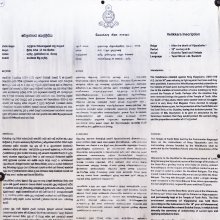Samaga, Sāmaga, Samāga, Saman-ga: 9 definitions
Introduction:
Samaga means something in Hinduism, Sanskrit, Jainism, Prakrit. If you want to know the exact meaning, history, etymology or English translation of this term then check out the descriptions on this page. Add your comment or reference to a book if you want to contribute to this summary article.
Images (photo gallery)
In Hinduism
Purana and Itihasa (epic history)
Source: archive.org: Puranic EncyclopediaSāmaga (सामग).—A particular line of disciples of Vyāsa. (See under Guruparamparā).
Source: Cologne Digital Sanskrit Dictionaries: The Purana Index1a) Sāmaga (सामग).—Eligible for Pārvaṇa śrāddha;1 best for a gift;2 to be sung in connection with the rituals in digging tanks, wells, etc.3
1b) Prācya and Kārtā;1 8014 sāmas, āraṇyaka and homa.2

The Purana (पुराण, purāṇas) refers to Sanskrit literature preserving ancient India’s vast cultural history, including historical legends, religious ceremonies, various arts and sciences. The eighteen mahapuranas total over 400,000 shlokas (metrical couplets) and date to at least several centuries BCE.
Languages of India and abroad
Sanskrit dictionary
Source: DDSA: The practical Sanskrit-English dictionarySamāga (समाग).—
1) To come or meet together, assemble.
2) To become joined or united, to associate, keep company with.
3) To have sexual intercourse with.
4) To come together, be in conjunction (as planets).
5) To come near, approach.
6) To return.
7) To find, meet with.
Derivable forms: samāgam (समागम्).
--- OR ---
Sāmaga (सामग).—a Brāhmaṇa who chants the Sāmaveda.
Derivable forms: sāmagaḥ (सामगः).
Sāmaga is a Sanskrit compound consisting of the terms sāman and ga (ग).
Source: Cologne Digital Sanskrit Dictionaries: Shabda-Sagara Sanskrit-English DictionarySāmaga (सामग).—m.
(-gaḥ) A Brahman who chants or recites the Sama-Veda. f. (-gī) The wife of a Sama-Vedi Brahman. E. sāma the Sama-Veda, gai to sing, ḍa aff.
Source: Cologne Digital Sanskrit Dictionaries: Cappeller Sanskrit-English DictionarySāmaga (सामग).—[masculine] chanter of the Sāmaveda.
--- OR ---
Sāmagā (सामगा).—[masculine] chanter of the Sāmaveda.
Source: Cologne Digital Sanskrit Dictionaries: Monier-Williams Sanskrit-English Dictionary1) Sāmaga (सामग):—[=sāma-ga] [from sāma > sāman] m. a Brāhman who chants or recites the S°, [Ṛg-veda] etc. etc.
2) Sāmagā (सामगा):—[=sāma-gā] [from sāma > sāman] a m. a Brāhman who chants or recites the S°, [Ṛg-veda] etc. etc.
3) [=sāma-gā] [from sāma > sāman] b See -ga.
Source: Cologne Digital Sanskrit Dictionaries: Yates Sanskrit-English DictionarySāmaga (सामग):—[sāma-ga] (gaḥ) 1. m. A Brāhman who recites the Sāma Vedas. f. (ī) Wife of one.
[Sanskrit to German]
Sanskrit, also spelled संस्कृतम् (saṃskṛtam), is an ancient language of India commonly seen as the grandmother of the Indo-European language family (even English!). Closely allied with Prakrit and Pali, Sanskrit is more exhaustive in both grammar and terms and has the most extensive collection of literature in the world, greatly surpassing its sister-languages Greek and Latin.
Prakrit-English dictionary
Source: DDSA: Paia-sadda-mahannavo; a comprehensive Prakrit Hindi dictionarySāmāga (सामाग) in the Prakrit language is related to the Sanskrit word: Śyāmāka.
Prakrit is an ancient language closely associated with both Pali and Sanskrit. Jain literature is often composed in this language or sub-dialects, such as the Agamas and their commentaries which are written in Ardhamagadhi and Maharashtri Prakrit. The earliest extant texts can be dated to as early as the 4th century BCE although core portions might be older.
See also (Relevant definitions)
Partial matches: Ga, Cama, Sama, Saman.
Starts with (+39): Camakaliyani, Camakam, Camakan, Camakanam, Camakantam, Camakantar, Camakari, Camakonam, Samaagat-prasang, Samagaccha, Samagacchati, Samagacchi, Samagadha, Samagadhatara, Samagadhi, Samagahnika, Samagai, Samagalita, Samagalla, Samagam.
Ends with: Besamaga, Jyeshthasamaga, Krantasamaga, Prachyasamaga, Pracyasamaga, Udichyasamaga, Udicyasamaga, Uvasamaga.
Full-text (+20): Samagama, Samagam, Samagaprayoga, Samagapurvapara, Samagavrishotsarga, Camakan, Samagahnika, Paushyanji, Samaganamchandas, Pracya, Jyeshthasamaga, Shyamaka, Udgatri, Karta, Sagaiccha, Samagi, Jyeshthasaman, Pavamana, Hayi, Talaka.
Relevant text
Search found 11 books and stories containing Samaga, Sāmaga, Samāga, Saman-ga, Sāman-ga, Sāmagā, Sama-ga, Sāma-ga, Sāma-gā, Sāmāga; (plurals include: Samagas, Sāmagas, Samāgas, gas, Sāmagās, gās, Sāmāgas). You can also click to the full overview containing English textual excerpts. Below are direct links for the most relevant articles:
The Skanda Purana (by G. V. Tagare)
Chapter 41 - Luṃpeśvara (luṃpa-īśvara-liṅga) < [Section 2 - Caturaśīti-liṅga-māhātmya]
Chapter 201 - Decision on Problems Relating to Nāgaras < [Section 1 - Tīrtha-māhātmya]
Chapter 26 - The Marriage of Hara and Gaurī Celebrated < [Section 2 - Kaumārikā-khaṇḍa]
Rig Veda (translation and commentary) (by H. H. Wilson)
Puranic encyclopaedia (by Vettam Mani)
The Brahmanda Purana (by G.V. Tagare)
Chapter 35 - The legend of Yājñavalkya’s receiving the Veda from the Sun-God < [Section 2 - Anuṣaṅga-pāda]
Chapter 36 - The Lineage of Manu: Manvantaras < [Section 2 - Anuṣaṅga-pāda]
The Gautami Mahatmya (by G. P. Bhatt)
The Markandeya Purana (Study) (by Chandamita Bhattacharya)
Division of Varṇa (a): The Brāhmaṇas < [Chapter 2]
Related products

